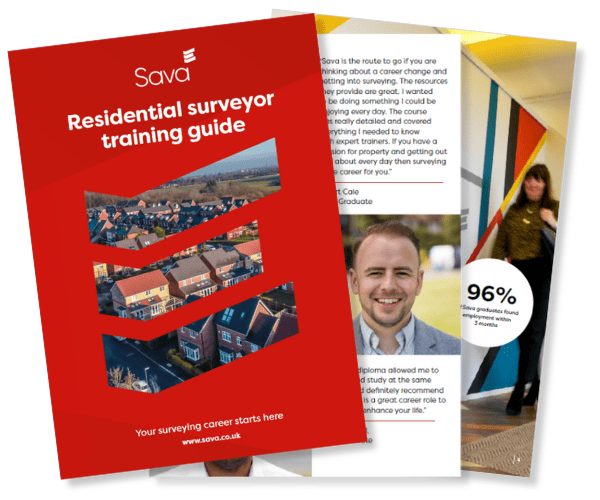How to become a residential building surveyor.

There are 29 million homes in the UK, with more than a million residential property transactions being made every year.
For homebuyers, commissioning a pre-purchase condition survey is recommended to uncover any risks and defects, and to make sure their dream home isn’t a hidden nightmare. For homeowners, a condition survey might be commissioned to diagnose a suspected issue or advise on repair work or suggest further investigation by a specialist.
This is where the expertise of a residential building surveyor should be sought.
What is a residential building surveyor?
A residential building surveyor is qualified to inspect people’s homes and report on the risks and opportunities present at the property. Specialising in residential buildings, this kind of surveyor uses their deep understanding of construction, building pathology and surveying skills to identify issues and defects such as dampness, structural movement, drainage problems and woodworm.
As such, residential building surveyors are often commissioned by homebuyers for peace of mind before they purchase a new home or by homeowners looking to develop their property or investigate an existing problem. Some residential building surveyors are even employed by housing organisations to report on the condition of their housing stock.
Why become a residential building surveyor?
For as long as homes are bought and sold, the skills and expertise of residential building surveyors will be needed in the property sector to ensure transparency when it comes to building safety and housing condition.
The profession is well respected and carries with it a sense of professionalism that is enhanced further by the professional memberships you can apply for once you qualify.
In our recent LinkedIn poll, 37% of survey respondents said the biggest benefit of being a residential building surveyor is the variety of the work, with no two homes the same and every inspection being its own journey of discovery. Great work/life balance and earning potential came in a close second and third as the stand-out benefits that make the job worthwhile.
How to become a residential building surveyor
There are a couple of routes into the industry and how you choose to become a residential building surveyor will be largely dependent on your circumstances.
Surveyors come from all walks of life – many pursue the career from an early age due to an interest in property or the profession running in the family and choose to undertake a related degree accredited by the Royal Institution of Chartered Surveyors (RICS), e.g. a degree in Real Estate or Estate Management, to gain a broad understanding of all property types before then specialising in residential property (or, indeed, another specialism). Depending on experience, this route can take between three and five years. Degree apprenticeships delivered by a university are also available for those who wish to pair academic study with work experience.
Those who have no desire to go to university or are looking for a career change later in life might require a more flexible but focused route into the surveying industry. For these individuals, a vocational qualification such as the Diploma in Residential Surveying and Valuation, delivered by Sava, offers a part-time pathway into the profession in just 24 months. With an average of two contact days per month, Sava learners can continue working alongside their studies, making the diploma a more accessible qualification to achieve. Once qualified, Sava graduates can begin practising immediately and, if desired, apply for professional memberships to the Royal Institution of Chartered Surveyors (RICS) and the Chartered Association of Building Engineers (CABE) at Associate level. Additionally, the diploma provides training on how to carry out residential property valuations – a sought-after skill in the industry.
What career pathways are available?
There are a broad range of opportunities out there for residential building surveyors, some more typical than others.
- Working for a corporate/national surveying firm
- Working for an SME
- Working as an independent practitioner
- Working for a housing provider/association
- Working in a specialist role such as a Party Wall Surveyor
Many surveyors will experience more than one of these roles during their career, with some gaining valuable experience in a firm before then setting up their own businesses.
Is a career in residential building surveying worthwhile?
Life as a residential building surveyor is varied and can be both financially and personally rewarding as you help homebuyers and homeowners to understand what is likely one of the most important assets they will ever own. If you have an interest in property and a penchant for problem solving, a career in surveying is the perfect way to put your detective skills to good use.
Independent surveyor, Neil Trewick, says:
“I survey in the morning and once that’s complete the rest of my day is up to me. I can go home and write reports up straightaway or if the sun is shining I might choose to play golf and write reports in the evening. I never work weekends anymore and I feel more in control.” (Read Neil’s full surveyor case study.)
Sava diploma graduate, Callum Walker, says:
“It’s the best thing I’ve ever done from a career perspective.” (Read Callum’s full surveyor case study.)
Training with Sava
If you’d like to find out more about becoming a residential building surveyor through Sava’s Diploma in Residential Surveying and Valuation, head to our dedicated surveyor training page, download our Residential Surveyor Training Guide, or you can contact a course provider by emailing hello@sava.co.uk, calling 01908 442158 or opening a chat on WhatsApp with a member of the team.
